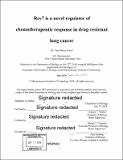Rev7 is a novel regulator of chemotherapeutic response in drug-resistant lung cancer
Author(s)
Vassel, Faye-Marie.
Download1126278102-MIT.pdf (21.82Mb)
Other Contributors
Massachusetts Institute of Technology. Department of Biological Engineering.
Advisor
Graham C. Walker and Michael T. Hemann.
Terms of use
Metadata
Show full item recordAbstract
Most malignant cancers are treated with chemotherapeutic agents that target and damage cellular DNA While genotoxic chemotherapies have proven to be highly effective agents for cancer therapy, it is well known that intrinsic and acquired cancer drug resistance is a problem that severely limits the successful elimination of a wide range of malignancies. This point is particularly important in the context of genotoxic chemotherapies, because the DNA damaging agents used in cancer treatment induce a diverse spectrum of toxic lesions that are recognized by a variety of DNA damage response (DDR) mechanisms. In this thesis I used CRISPR-Cas9 gene-editing and other molecular biology and biochemical techniques to examine the functional relevance of that Rev7, a multi-functional translesion synthesis (TLS) DNA damage tolerance protein in drug-resistant cancers. In particular, I employed CRISPR-Cas9 gene-editing technologies to generate Rev7 knockout (KO) drug-resistant lung cancers cell to use as a tool to investigate the impact that Rev7 loss may have on chemotherapeutic efficacy. Excitingly, this work reveals that Rev7 loss sensitizes intrinsically drug-resistant lung tumors to cisplatin and drastically enhances the overall survival of syngeneic mice transplanted with drug-resistant lung tumors. Additionally, in this thesis I conducted immunoprecipitation and mass spectrometry to better elucidate the Rev7's functional relevance. Mass spectrometry findings in this thesis reveal that when Rev7 is immunoprecipitated under different cellular conditions (i.e. G2/M arrested or DNA damaged cells), Rev7 interacts with novel and diverse Rev7 protein interactors. Intriguingly, my mass spectrometry findings also reveal that Rev7 forms protein-protein interactions with many proteins that play a role in regulating double-strand break (DSB) repair. Given these findings we conducted DSB repair studies investigating if Rev7 plays a role regulating DSB repair in drug-resistant lung cancer. Notably, these studies suggest that Rev7 loss results in a decrease in DSB repair capacity and increases in DSBs in drug-resistant lung cancer cells. Altogether, this thesis demonstrates that Rev7 has functional relevance in modulating chemotherapeutic response in drug-resistant lung cancer. Further, this thesis presents findings that strongly argue that the development of small molecule inhibitors targeting Rev7 may provide a new way to enhance chemotherapeutic efficacy in drug-resistant tumors in the clinic.
Description
Thesis: Ph. D., Massachusetts Institute of Technology, Department of Biological Engineering, 2018 Cataloged from PDF version of thesis. Includes bibliographical references (pages 184-197).
Date issued
2018Department
Massachusetts Institute of Technology. Department of Biological EngineeringPublisher
Massachusetts Institute of Technology
Keywords
Biological Engineering.